
Brazil–South Africa relations are the bilateral relations between the Federative Republic of Brazil and the Republic of South Africa. Both nations are members of the BRICS, Cairns Group, G20, Group of 24, Group of 77 and the United Nations.
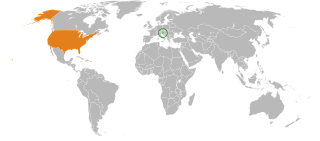
The United States has maintained an official presence in Slovenia since the early 1970s, when the United States Information Agency (USIS) opened a library and American press and cultural center in Ljubljana. From its opening through 1992, the American Center worked to develop closer grassroots relations between the United States and the people of the then-Socialist Republic of Slovenia, a constituent republic of the Socialist Federal Republic of Yugoslavia. On December 23, 1990, the Slovene people voted in a plebiscite to separate from greater Yugoslavia. On June 25, 1991, the new Republic of Slovenia officially declared its independence from the Federal Republic of Yugoslavia. A 10-day war commenced, during which Slovenian territorial troops fought off incursions by the Yugoslav People's Army. The United States formally recognized the new republic on April 7, 1992. To develop U.S. diplomatic relations with the new state, the United States opened a new Embassy in Ljubljana in August 1992. From the departure of Yousif Ghafari in January 2009 till November 2010, the U.S. Ambassador position was vacant. From November 2010 to 2015 it was held by Joseph A. Mussomeli. The Ambassador position is currently held by Jamie Harpootlian.
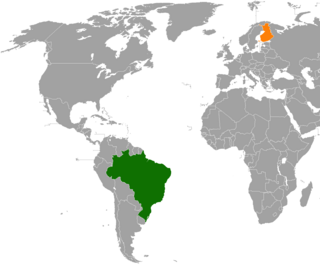
Brazil–Finland relations are the diplomatic relations between Brazil and Finland.

Moldova–Slovenia relations are the bilateral relations between Moldova and Slovenia. Moldova recognized the Republic of Slovenia under an unknown date. Diplomatic relations were established on October 27, 1993. Both countries are represented in each other through their embassies in Budapest (Hungary). Slovenia is a member of the EU, which Moldova applied for in 2022. Both countries are full members of COE.

Current and historical relations exist between the Commonwealth of Australia and the Federative Republic of Brazil. Both nations are members of the Cairns Group, G20 and the United Nations. Australia and Brazil are the largest countries in the Southern Hemisphere.
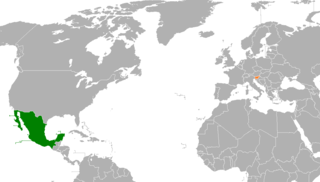
The nations of Mexico and Slovenia established diplomatic relations in 1992. Both nations are members of the Organisation for Economic Co-operation and Development and the United Nations.

Argentina–Slovenia relations refers to the bilateral relationship between Argentina and Slovenia. Both nations are members of the United Nations.
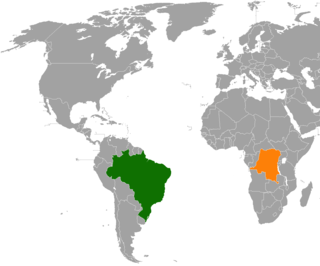
Brazil and the Democratic Republic of the Congo established diplomatic relations in 1968. Both nations are members of the Group of 24, Group of 77 and the United Nations.

Brazil–Kenya relations are bilateral relations between the Federative Republic of Brazil and the Republic of Kenya. Both nations are members of the Group of 77 and the United Nations.

India–Slovenia relations are the bilateral relations between India and Slovenia.
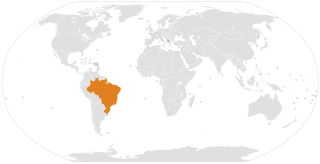
Albania–Brazil relations are the bilateral relations between Albania and Brazil. Albania has an embassy in Brasília, and Brazil has an embassy in Tirana.

Relations between Armenia and Brazil, have existed for decades. The Armenian community in Brazil is the second largest in Latin America totaling approximately 100,000 members. Armenia has an embassy in Brasília and Brazil has an embassy in Yerevan.

Brazil–Qatar relations are the bilateral relations between Brazil and Qatar. Diplomatic relations were formed in 1974.

Brazil–Czech Republic relations are the diplomatic relations between the Federative Republic of Brazil and the Czech Republic. Both nations enjoy friendly relations, the importance of which centers on the history of Czech migration to Brazil. Approximately 500 thousand Brazilians have Czech ancestry. Both nations are members of the United Nations.

Georgia–Slovenia relations are the bilateral relations between Georgia and Slovenia, two European nations with a communist past that established their bilateral ties in 1993. Their relations have been highly represented with a close diplomatic partnership, with Slovenia being one of the staunch supporters of Georgia's territorial integrity and pro-Western path. Both nations are members of the COE. Slovenia is a member of the EU, which Georgia applied for in 2022.

Brazil–Guinea-Bissau relations are the bilateral relations between the Federative Republic of Brazil and the Republic of Guinea-Bissau. Both nations are members of the Community of Portuguese Language Countries, Group of 77 and the United Nations.
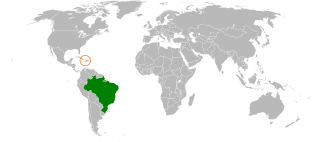
Brazil–Haiti relations are the current and historical relations between the Federative Republic of Brazil and the Republic of Haiti. Both nations are members of the Community of Latin American and Caribbean States, Organization of American States and the United Nations.

Brazil–Ethiopia relations are the current and historical relations between Brazil and Ethiopia. Both nations are members of the Group of 77, BRICS and the United Nations.

Brazil–Tanzania relations refers to the bilateral relations between Brazil and Tanzania. Both nations are members of the Group of 77 and the United Nations.
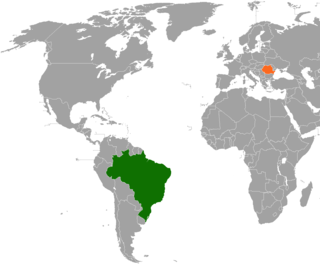
Brazil–Romania relations are the bilateral relations between Brazil and Romania. Both nations are members of the United Nations.





















